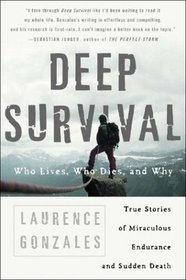Helpful Score: 3
This book explores the psychology of survival. It is not a scientific study of survival, it's not a how-to manual, but an analysis of specific true survival stories. Most of the book is in narrative form, reflections on the author's first hand accounts of survival and retellings of other first hand accounts. The goal of this book is not so much to outline a survival method, but to explore and cultivate the survivor mind.
Helpful Score: 3
I was very disappointed in this book. The stories of survival are great but he never tells one complete story, instead interspersing his own ideas and/or beliefs as to why things happen the way they do. I actually read to about page 200 before it got interesting and I kept waiting for the book to take a turn for the better. It got better but not by much.
Helpful Score: 1
An riveting examination of why some people are survivors and others are victims. The author's examples of extreme situations that people have survived (or not) were well researched and presented in interesting detail. I found myself compelled to finish this with a drive that is usually reserved for the best fiction.
Helpful Score: 1
As a self-proclaimed couch potato, I was somewhat surprised by how much I actually enjoyed this book. It is well-written, interesting, educational, and facinating. The author does not give pat answers or trite suggestions, but instead investigates the psyche, attitude, and mind of survivors. Anyone interested in extreme outdoor activities, and anyone interested in the brain and the mind, should read this book.
Helpful Score: 1
I can understand why some people would have problems completing this book (such as my mother who gave up quickly). The beginning of the book spends a lot of time discussing the mechanisms of the human mind and is very scientific. Personally, I just skipped over those paragraphs until the author got back on track with the interesting points that would lead someone unscientific like me to be reading this book.
He covers many unknown,well known and personal survival stories. The book begins and ends telling the story of his father who was a WWII fighter pilot that was shot down and held as a prisoner of war in Germany. There are many references to those who did and did not survive the World Trade Center collapses. Some of the other incidents covered are; river rafting accidents, mountain climbing incidents, an avalanche, a skiier who goes off trail and becomes lost, hikers lost in the woods (including the author), a Peruvian airline crash and survival at sea.
The book gets more interesting when the author gets passed the brain chemistry of survival and delves into the emotions of the people who survive. The book gives you a good foundation of what you would require mentally to survive a catastrophic event.
He covers many unknown,well known and personal survival stories. The book begins and ends telling the story of his father who was a WWII fighter pilot that was shot down and held as a prisoner of war in Germany. There are many references to those who did and did not survive the World Trade Center collapses. Some of the other incidents covered are; river rafting accidents, mountain climbing incidents, an avalanche, a skiier who goes off trail and becomes lost, hikers lost in the woods (including the author), a Peruvian airline crash and survival at sea.
The book gets more interesting when the author gets passed the brain chemistry of survival and delves into the emotions of the people who survive. The book gives you a good foundation of what you would require mentally to survive a catastrophic event.





